
Brigitte Fontaine, is a singer of avant-garde music. She has employed numerous unusual musical styles, melding rock and roll, folk, jazz, electronica, spoken word poetry, and world. She has collaborated with Stereolab, Michel Colombier, Jean-Claude Vannier, Areski Belkacem, Gotan Project, Sonic Youth, Antoine Duhamel, Grace Jones, Noir Désir, Archie Shepp, Arno, and The Art Ensemble of Chicago. She is also a novelist, playwright, poet, and actress.
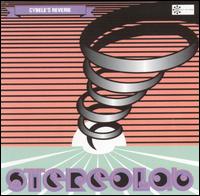
Cybele's Reverie is an EP by English-French rock band Stereolab, released on 19 February 1996 by Duophonic Records. Its title track serves as the lead single from their fourth studio album Emperor Tomato Ketchup. The four-track EP is the only one by Stereolab on which none of the songs are in English: the title track, "Brigitte", and "Young Lungs" are in French, and "Les Yper-Yper Sound" is an instrumental.

Pierre Barouh was a French writer-composer-singer best known for his work on Claude Lelouch's film A Man and a Woman both as actor, and as lyricist/singer for Francis Lai's music for the film.
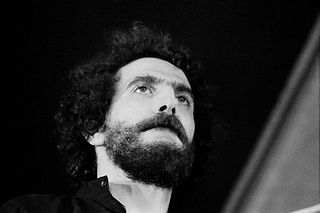
Areski Belkacem, also known simply as Areski, is a French singer, multi-instrumentalist, comedian and composer.

13 chansons décadentes et fantasmagoriques is the first album by experimental French singer Brigitte Fontaine, released in 1966 on the Productions Jacques Canetti label. Fontaine has disowned the album, which she states is merely a "draft" compared to her later works.
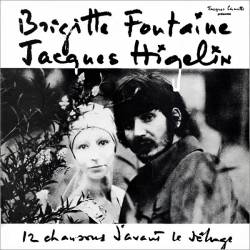
12 chansons d'avant le déluge is the second album by experimental French singer Brigitte Fontaine, and the first by French rock singer Jacques Higelin, released in 1966 on the Productions Jacques Canetti label. It was their only real release on the label, they would go on to release a few more singles that would be collected on the 15 chansons d'avant le déluge, suite et fin album in 1976, before moving to the Saravah label.

Brigitte Fontaine est... folle ! is the third album by experimental French singer Brigitte Fontaine, released in 1968 on the Saravah label. Fontaine herself considers this album to be her first real album. Jean-Claude Vannier authors the arrangements of the album.
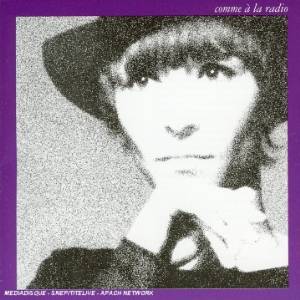
Comme à la radio is the fourth album by experimental French singer Brigitte Fontaine, recorded with Areski Belkacem and the Art Ensemble of Chicago. It was released in 1969 on the Saravah label after a series of concerts in 1969. It is Fontaine's most famous album, and is known outside of France on the 1990s alt-rock scene, thanks to laudatory comments from Beck Hansen, or Sonic Youth among others.
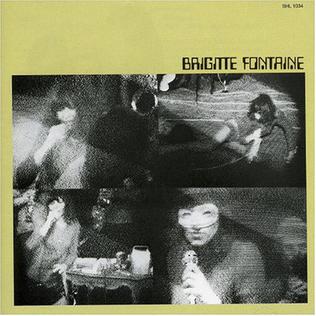
Brigitte Fontaine is the fifth album by experimental French singer Brigitte Fontaine, released in 1972 on the Saravah label.
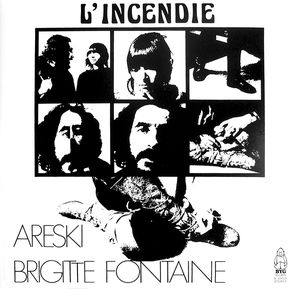
L'Incendie is the seventh album by experimental French singer Brigitte Fontaine and the fifth by Areski Belkacem, released in 1974 on the Byg Records label. It is their third collaborative album.

Le Bonheur is the eighth album by experimental French singer Brigitte Fontaine and the sixth by Areski Belkacem, released in 1975 on the Saravah label. It is their fourth collaborative album.

15 chansons d'avant le déluge, suite et fin is a compilation by experimental French singer Brigitte Fontaine and French rock singer Jacques Higelin, released in 1976 on the Productions Jacques Canetti label.

French corazon is the eleventh album by experimental French singer Brigitte Fontaine, released in 1988 on the EMI label. It was originally released in Japan only, but was finally released in France in 1990. It was also re-released under the title Le Nougat in 1999, after the most well-known song from the album, which was the closest Fontaine would ever have to a hit, and without the original title track.

Genre humain is the twelfth album by experimental French singer Brigitte Fontaine, released in 1995 on the Virgin Records label. The album features a new version of Comme à la radio, the title track from her 1970 album. The song Il se mêle à tout ça is inspired by an autobiographic event of her life.
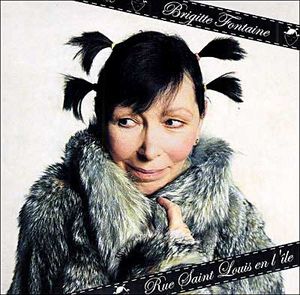
Rue Saint Louis en l'Île is the fifteenth album by experimental French singer Brigitte Fontaine, released in 2004 on the Virgin Records label. It features a new version of Le Nougat from her French corazon album with Mustapha and Hakim Amokrane of French band Zebda, as well as a duet with Areski Belkacem, Le Voile à l'école. There's also a cover of Édith Piaf, L'Homme à la moto, which was present before on an hommage album to the singer, in the words of Fontaine, "just to show off".

Libido is the sixteenth album by experimental French singer Brigitte Fontaine, released in 2006 on the Polydor label. It once again features a collaboration with -M- on the song Mister Mystère, which -M- also sang solo on his fourth album, to which it gave its title. Brigitte Fontaine, for the first time in more than thirty years, calls upon arranger Jean-Claude Vannier for some songs, Barbe à papa and Mendelssohn. The title of Château intérieur comes from a book by Teresa of Ávila, although Fontaine admitted she didn't read it.

Prohibition is the seventeenth album by experimental French singer Brigitte Fontaine, released in 2009 on the Polydor label. The album features political content, as it is described by Fontaine as "a rebellious album", and the song Partir ou rester was written as a reaction to the 2007 French presidential election.
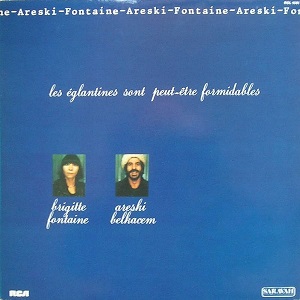
Les églantines sont peut-être formidables is the tenth album by experimental pop French musician Brigitte Fontaine and the eighth by Areski Belkacem, released in 1980 on the Saravah label. Because of its arrangements, described as almost "disco" by Fontaine herself, a sound that she can't stand, she has disowned the album and refused its re-release on CD, although it has been pressed in Japan in October 2008 by the Columbia Music Entertainment label.


















